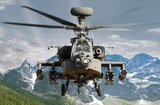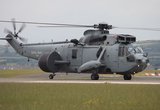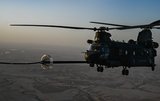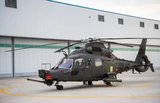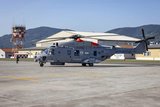AFS Nears Certification for Bell 430 Engine Inlet Filter
Aerospace Filtration Systems, Inc. (AFS) anticipates near-term Federal Aviation Administration (FAA) certification for an Inlet Barrier Filter (IBF) system for the Bell 430 helicopter. With this new IBF solution from AFS, Bell 430 operators will enjoy reduced operating costs with the best-engineered inlet protection available. Certification is expected in the next several months with production kits available shortly thereafter.
AFS officials said strong industry interest as well as a straightforward design and integration effort made the 430 project possible in parallel with other larger efforts. "Many operators have contacted us requesting assistance in improving their engine protection for their 430 helicopters," said AFS Business Development Director Robert Stenberg. "Our Bell 430 system can help offshore, corporate, EMS and other operators reduce the likelihood of engine damage from FOD, salt-spray corrosion, and other contaminants, offering a better solution than currently available." AFS also benefited from a strong partnership with a large operator in pursuing this development effort. "We are always eager to make sure our customers know we support their needs," Stenberg added.
The new AFS system features a sealed intake plenum with AFS filter elements that replace the inlet screens or particle separator internally on each engine intake, utilizing existing mounting provisions. As with all certified AFS IBF's, the 430 system includes a unique intake bypass system. Such an emergency bypass capability is an important IBF feature that is lacking in most traditional sand filters and particle separators.
A simple compact cockpit switch, common with existing AFS certified systems, allows indication and activation of the bypass system. And as with all AFS IBF's, an integral Filter Maintenance Aid allows for on-condition inspections between established cleaning intervals, eliminating unnecessary service. Filter service cycle is required at 300 flight hours or one year with each filter capable of 15 service cycles (4,500 flight hours).
AFS is the industry leader in the design, development and manufacture of high-performance engine IBF systems for commercial and military propulsion systems. The company manufactures certified IBF solutions for the Eurocopter EC130, AS350 B/BA/B1/B2/B3, AS350's with Soloy or Heli-Lynx Honeywell engine conversions; AgustaWestland A119 Koala, AW119Ke; Bell 205A1, 206B, 407, 206L-3/4, 206L-1(C30); MD Helicopters MD 369H Series, MD 500D/E/F and MD 900/902. IBF systems for the AgustaWestland AW109E/S and AW139 as well as the Bell 206L are also in development.
AFS is a wholly owned subsidiary of the Donaldson Company, Inc. Traded on the NYSE under the symbol DCI, Donaldson is a member of the S&P MidCap 400 Index. Additional company information for AFS and DCI is available at www.afsfilters.com andwww.donaldson.com.
Visit AFS on the Web at www.AFSfilters.com and at the upcoming HELI-EXPO 2009 in Anaheim, Calif., February 22-24, 2009.
More from Defence Helicopter
-
![Germany to send WS-61 Westland Sea King helicopters to Ukraine]()
Germany to send WS-61 Westland Sea King helicopters to Ukraine
Germany has committed to sending Ukraine six of its 21 retiring WS-61 Westland Sea King multirole, amphibious helicopters.
-
![Boeing secures $271 million to advance modernisation of US Special Operations' MH-47G Chinook]()
Boeing secures $271 million to advance modernisation of US Special Operations' MH-47G Chinook
Boeing has clinched a major contract modification to further its backing of the US Special Operations Command’s MH-47G Chinook aircraft modernisation effort.
-
![Dubai Airshow 2023: South Korean homegrown helicopters make international debut]()
Dubai Airshow 2023: South Korean homegrown helicopters make international debut
Two KAI helicopters, the KUH-1E utility helicopter and the Light Attack Helicopter (LAH), have taken centre stage at the Dubai Airshow 2023.
-
![Italian Navy receives final NH90 helicopter]()
Italian Navy receives final NH90 helicopter
The Italian Navy now boasts a fleet of 56 NH90 helicopters comprising 46 SH-90As and 10 MH-90As.
-
![Argentina seeks AW109 and CH-46 Sea Knight helicopters]()
Argentina seeks AW109 and CH-46 Sea Knight helicopters
The Argentinian Air Force (FAA) and the Argentinian Naval Aviation Command (COAN) are looking for options to upgrade their helicopter fleets.
-
![DSEI 2023: Lockheed to produce about 40% of Black Hawks on UK soil if it wins NMH contest]()
DSEI 2023: Lockheed to produce about 40% of Black Hawks on UK soil if it wins NMH contest
Lockheed Martin promises a boost to the British job market and export opportunities, while strengthening ties with Poland and positioning the UK for a future in rotorcraft technology in the event of a New Medium Helicopter competition triumph.












